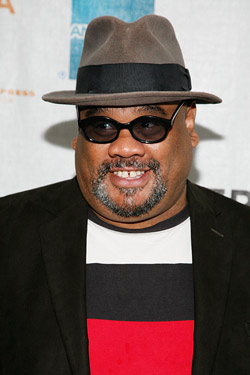
Passing Strange, the autobiographical African-American hipster musical cooked up by the musician known as Stew (along with now-ex-girlfriend Heidi Rodewald), proved to be too much for Broadway’s older set — it played to shrinking audiences last year, closing after failing to win a Best Musical Tony (though it won for best book). Luckily, Spike Lee swooped in just in time, shooting the last two performances, rescuing Passing Strange for posterity as one of the best concert films we’ve ever seen. Stew talked to Vulture about the film, which starts a two-week run at IFC today, and about some of the Broadway run’s darker moments.
How did you get Spike Lee onboard? I know he saw Passing Strange several times …
The first thing he said to me when I met him at the Public Theater was, “it’s very cinematic.” I kind of filed that away. We had been talking to a ton of people, but Spike was always the dream.
What made him so ideal?
We didn’t know anybody else who we thought could really do it. His aesthetic to me is so much about bravado — the way he always lets you know you’re watching a film, he’s very much into the camera as this kind of presence.
Was he ever too much of a presence during your last few runs?
He came into my dressing room the day of shooting and said, “I need you to get the crowd on its feet.” Not even our theater director had told me to do anything in particular in regard to the audience — until that time it was my business. But he knows what he wants, and I trusted him.
Was it important to create a permanent record of the show?
No question. Suddenly, the hardest thing we ever worked on in our lives was going to end with no documentation. Theater people seem completely comfortable with this, but rock-and-roll people are not. I was ready to smuggle friends in with cameras — I’m not joking.
Do you wish Passing Strange had won Best Musical?
When I won for best book I felt very good, because the book was what I worked on more than anything. Everybody else wanted Best Musical so we could stay open forever. But I wasn’t having the best time on Broadway anyway because of me and Heidi’s relationship, which broke up while we were at Berkeley [where the show had its earliest run]. You take two people who dedicated their lives to each other and to their work, have them struggle for ten years, and finally when they reach a point where they can survive from their art and live comfortably, they break up … and then they’re in a play about the struggles of love, life, and art and they’re reminded of that eight times a week! It’s a recipe for a lot of therapy. People wondered why I was often surly on the job, and that’s why. We closed, for me, at the right time.
Maybe Spike Lee should have made this a Behind the Music episode.
That’s what I’m doing!
That’s right, you’re writing a song cycle based on your relationship. Is Heidi cool with that?
She has to be. She may not be cool with it once she sees all the writing I’ve done, but she can choose to not be involved with it. I can’t half-step with subject matter.
You certainly didn’t half-step with your music — and so many “rock” Broadway shows do.
Hedwig is the real thing, but it didn’t go to Broadway. Yeah, what I hear that is called rock music on Broadway, as I hear it, still doesn’t sound like rock music someone would listen to in their car or at home. I find it hard to get lumped into a category with some of these other musicals.
So, how did you feel about In the Heights winning for Best Musical?
I actually feel like they were the best musical, because I don’t think we were really a musical to begin with. We were the best Passing Strange, and there’s no award for that.

